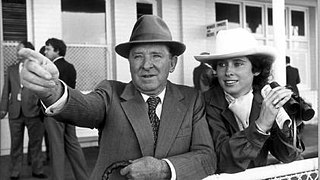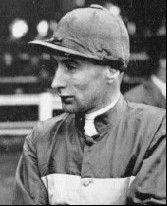Related Research Articles

A jockey is someone who rides horses in horse racing or steeplechase racing, primarily as a profession. The word also applies to camel riders in camel racing. The word "jockey" originated from England and was used to describe the individual who rode horses in racing. They must be light, typically around a weight of 100–120 lb. (45–55 kg), and physically fit. They are typically self-employed, and are paid a small fee from the horse trainer, whose colors they wear while competing in a race. They also receive a percentage of the horse's winnings. The job has a very high risk of debilitating or life-threatening injuries, not only from racing accidents but also, because of strict weight restrictions, from eating disorders.

Damien Oliver is an Australian retired thoroughbred racing jockey. Oliver comes from a racing family; his father Ray Oliver had a successful career until his death in a race fall during the 1975 Kalgoorlie Cup in Western Australia. In 2008, Oliver was inducted into the Australian Racing Hall of Fame. In August 2023 he announced that he would retire at the end of that year's spring carnival.
Kingston Town was a champion Australian Thoroughbred racehorse who won three Cox Plates and 11 other Group One races and was the 1980 Australian Champion Racehorse of the Year.

The racing of Thoroughbred horses is a popular gaming and spectator sport and industry in New Zealand.
Roy Henry Higgins MBE was an Australian jockey who rode from the late 1950s to the early 1980s. His talent in the saddle was to later earn him the nickname "The Professor".

Thomas John Smith was a leading trainer of thoroughbred racehorses based in Sydney, New South Wales.
Raymond Shane Dye, is a former jockey. He was an apprentice jockey to Dave O’Sullivan at Matamata, before moving to Sydney, Australia where he was initially working with Vic Thompson at Warwick Farm in the late-1980s. In a distinguished riding career, Dye won the Melbourne Cup on Tawriffic in 1989 in then-record time, and won four consecutive Golden Slippers from 1989 to 1992. He also won the Cox Plate on Octagonal in 1995.
George Thomas Donald MooreOBE was an Australian jockey and Thoroughbred horse trainer. He began his career in racing in 1939 in Brisbane where he quickly became one of the top apprentice jockeys and where in 1943 he won the Senior Jockeys' Premiership. He then relocated to Sydney and in 1949 went to work for trainer Tommy J. Smith with whom he would have considerable success.

William James Williamson was an Australian jockey who enjoyed considerable success in Australia during the 1950s and in Europe during the 1960s. He was named after his father William James Williamson, a machinist, and his wife Euphemia Agnes.
Jim Cassidy, often referred to as "Jimmy" is a retired New Zealand jockey who has been inducted in both the Australian Racing Hall of Fame and the New Zealand Racing Hall of Fame.
Theodore Green, often referred to as Theo Green, was an Australian race horse trainer and jockey mentor. He was made a member of the Australian Racing Hall of Fame in 2002.
William Henry Cook was an Australian jockey.

Darren Beadman is an Australian champion jockey. In 2007 at age 41 he was the youngest jockey ever to be inducted into the Australian Racing Hall of Fame, being the first to do so while still active in the industry.
John Michael Purtell was an Australian jockey who rode three Melbourne Cup winners.
Brent Thomson is a New Zealand jockey, who is best known for winning the Cox Plate on four occasions and his association with the champion horse Dulcify.
Linda Christine Jones is a New Zealand former thoroughbred horse racing jockey. She was the first woman to be granted a race licence in New Zealand in 1977 and the first in Australasia to achieve four victories in a single day the following year. Jones finished second in the 1978/1979 Jockey Premiership with 18 winners by Christmas 1978. She later became the first woman to ride a Derby winner in each of the Australasia, Europe, and North America continents and the first female to beat professional male entrants at an Australian-registered event. Injury prompted Jones to retire in 1980; she had achieved 65 victories within 18 months. She is an inductee of both the New Zealand Sports Hall of Fame and the New Zealand Racing Hall of Fame.
Ron Hutchinson is a retired Australian jockey, who won over 1000 races in Europe. In a 37-year racing career, he was successful across three continents.
Mervyn "Merv" Maynard was an Aboriginal Australian jockey who rode numerous winners in a career spanning almost five decades.
John Hawkes is an Australian Thoroughbred racehorse trainer who is notable for heading:
David John O'Sullivan was a New Zealand Thoroughbred racehorse trainer. He is notable for having trained Horlicks to win the 1989 Japan Cup and many Group One races in New Zealand and Australia as well as being inducted into the New Zealand Racing Hall of Fame.
References
- ↑ "The racing worlds miracle". celebrityspeakers.com.au. Archived from the original on 30 December 2021. Retrieved 30 December 2021.
- ↑ "Past Champions Kingston Town". racerate.com. Retrieved 30 December 2021.
- ↑ "Hall of Fame jockey". ravingvictoria.com.au. Archived from the original on 30 December 2021. Retrieved 30 December 2021.
- ↑ "ATC honours hall of fame inductees". australianturfclub.com.au. Archived from the original on 30 December 2021. Retrieved 30 December 2021.